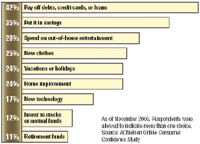Article
UPDATE
On finance and practice
Your retirement dollars get more protection

But the limit remains at $100,000 for other depository accounts until 2010, when the two federal agencies will decide whether to boost that level-and the higher limit for retirement accounts-to account for inflation. Limits can be indexed for inflation every five years after that.
While 76 percent of expectant parents think they're financially prepared, about 40 percent of new parents say they really weren't prepared after all, says a Redbook Magazine/Visa USA survey. An online calculator at http://www.practicalmoneyskills.com, an educational website set up by Visa, can help new and expectant parents estimate and budget monthly and one-time child-rearing costs.
Owner-sold houses bring in lower prices
Home sellers who use a real estate agent get 16 percent more for their houses than those who sell on their own, says the National Association of Realtors. The median price for a home sold with an agent was $230,000 last year, compared to $198,200 for those sold directly by the owner. In 2005, 13 percent of sellers opted not to use a real estate agent, down from 14 percent a year earlier. Buyers and sellers knew each other beforehand in nearly 40 percent of for-sale-by-owner transactions.
A repository for unloved cell phones
Can't get cell service in your office? You might be able to get out of your contract early, without paying a stiff fee, by joining Celltradeusa.com, an online phone-swapping service that matches dissatisfied cell phone users who want to ditch their plan with folks looking for a good deal. It's free to register, but sellers pay a one-time fee of $19.95 to read the responses of potential buyers.
What do you do with spare cash?

Do you have enough insurance?
Nearly half of consumers with a valuable collection don't have a special insurance policy to cover it, says a survey conducted for Trusted Choice, an insurance and financial services company. Almost one in five households surveyed owns a collection of wine, fine art, jewelry, antiques, or other valuables. In addition, nearly one in four have significantly remodeled their homes in the last three years, but a third of them hadn't updated their homeowners policy to reflect their homes' new value, and another 5 percent weren't sure if they had!
As for auto insurance, 85 percent of frequent carpoolers didn't change their liability coverage to reflect the added risks of extra passengers. Roughly 40 percent of families with a young driver who recently moved away from home didn't update their policy, either.





